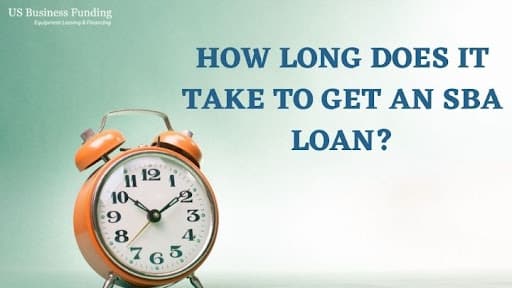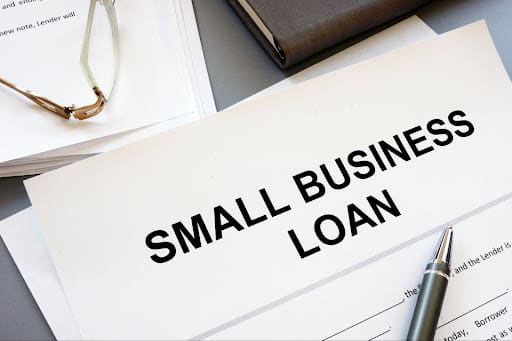How Long Does It Take to Get an SBA Loan?
Posted on: May 4, 2022 | Category: Small Business Loans·US Business Funding

If you’re a small business owner looking for funding, you’re probably hoping to get accepted for a loan as fast as possible. In view of reducing income or a critical requirement for expanded working capital, numerous entrepreneurs search for a private venture loan.
The SBA loan application and support process, for the most part, expects 60 to 90 days as the SBA processing time. Because of the large amount of paperwork and evidence required, an SBA loan can take longer to close than other small business loans and alternative financing alternatives.
There are several things you can do to expedite the SBA loan procedure. And the payout is worthwhile if you follow the process through to the finish — you’ll wind up with manageable payments, a long-term loan, and a low interest.
Let us understand the SBA loan process and help you know how much longer it takes compared to other types of company financing.
What is an SBA Loan?
An SBA loan is a government-backed loan for small businesses that can be used to fund startup costs, expansions, real estate purchases, and other expenses. A private lender issues this type of loan, but the federal government backs it.
A lending institution, such as a bank or credit union, is used to acquire an SBA loan. The lender then applies to the SBA for a loan guarantee, which implies that if you default on an SBA loan, the government will pay the lender the guaranteed amount.

According to the SBA, everyone with at least 20% ownership in a corporation must offer an unqualified personal guarantee. This guarantee holds you and your personal assets liable if your firm fails to make payments.
What Factors Include the SBA Processing Time?
Depending on the lender and loan size, the SBA loan process might take 60 to 90 days. This is comparable to the time it takes for other types of small company financing.
Gathering the necessary papers is often the most time-consuming component of the procedure. The sort of loan program you apply for and the quantity of money you want to borrow will be taken into account. You ought to anticipate that the methodology should take more time assuming you apply for an enormous loan with an extensive length than if you request a more modest loan with a more limited term.
Moreover, the moneylender you pick will affect what amount of time it requires. While all SBA Preferred Lender Program banks have the power to guarantee and lead credit minds SBA loans, they are not any different either way. Some are unpracticed, requiring SBA inclusion, which postpones the endorsement cycle.
What is the SBA Loan Procedure?
Because each firm is different, there is no standard schedule for seeking and receiving money. However, in general, an SBA loan application consists of the following steps:

The papers will be the first thing your loan specialist lender will ask for. Even for the most organized company owner, gathering all of the essential documents for your SBA loan package might take weeks.
Here’s a quick rundown of everything you’ll need to apply for an SBA loan:
Step 1: Gathering the Documents and Applying for the Loan
- Statement of your personal past (including former addresses, criminal records, educational background, names you’ve used, etc.)
- Your resumes, along with the resumes of any co-owners and business partners you may have)
- A letter requesting a business loan or a proposal for a business loan.
- Information on how you want to utilize the loan (do you want to invest in real estate, invest in a new business or buy equipment with it).
- Details about how old your firm is and how big is it?
- Credit report (for you and any business partners/co-owners).
- If you’re already in business, a business credit report (the credit status of your firm) is required.
- A business plan (that includes the goals and financial projections for your company)
- Personal and corporate income tax returns over the previous 2-3 years.
- Financial statements from the previous two to three years (debt schedules, balance sheets, P&L statements)
- Collateral, if there are any.
- Legal documents such as leases for real estate or commercial vehicles, franchise agreements, contracts with suppliers/vendors, articles of incorporation, and business licenses.
You may not have to get some of these records, such as credit reports. The lender can directly access it based on your personal and company details.
Along with submitting papers, you’ll need to complete the lender and SBA’s basic application forms. For instance, SBA will want you to complete SBA Form 413, SBA Form 912, and SBA Form 1919.
Step 2: Underwriting, Approval, and Commitment
During loan underwriting, the lender will look at the following items:
- Your credit history, both personal and corporate (expect the bank to do a hard credit pull)
- Your other debts, both personal and business-related.
- Verifying the collateral’s value.
- Other lenders with whom you’ve worked.
- Your company’s revenue history and forecasts.
- Any tax or legal challenges your company has encountered.
This process may take between one and two weeks.
Step 3: Loan Closure from SBA
Loan closing is the last step in getting your SBA loan. The bank will ensure that everything is in order and that all paperwork has been signed. The bank may need to check a few more papers, such as the title and environmental reports. The lender will also do a lien check to see if other firms have given you money.

The SBA will assign the loan a file number and approve the government guarantee. Closing takes one to two weeks on average. The loan amount will then be sent or deposited into your company’s bank account.
Speed up the Process with an SBA Express Loan:
With SBA Express Loan, you can speed up the cycle.
Regardless of whether the SBA loan seems, by all means, to be the ideal choice, the application process may be extended. As sometimes the SBA loan takes several days to lend money, you can accelerate the cycle with an SBA Express Loan.
The Express loan can be used in much the same way as a standard SBA 7(a) loan, yet the application framework is quicker. While SBA backs only 50% of the Express loans (versus 85% of the regular loan), you’ll have to put forth fewer documents. This can reduce the loan time to up to a month.
Benefits of Waiting for an SBA Loans:
SBA loans have a number of benefits. But one of the main reasons you’d prefer to apply for an SBA loan over other types of small company funding is:
For small business owners with a good credit history, they provide flexible terms and low-interest rates. If the repayment period for a $5 million loan comes about around seven to ten years, the typical SBA loan rate stands at somewhere in the range of 6% and 7%. However, the normal non-SBA loan rate comes between 7% and 10%.
Banks can offer good interest rates because, on default, the U.S. government can step up to make the payment. Banks can contribute with additional certainty and less risk on the grounds that the SBA goes about as a guarantor on these loans. Due to the lesser risk, the bank will charge you a lower interest rate as a sign of confidence and can trust in your ability to repay.
When to Explore Other Financing Opportunities?
Based on your demands or financial position, various forms of small business loans (or even other funding sources) may seem a better fit.
For example, if you need your loan authorized and money in your account quickly, an SBA loan schedule may be too long because the paperwork might take a long time to compile. If your credit score is below 660, your chances of getting an SBA loan are poor.
So, you should start exploring other financing opportunities when you expect a large loan, need a more extended payback period, and wait to have a lower interest rate.
Conclusion: Is an SBA Loan Worth the Extra Time?
From the day you gather documents to the time you have the money deposited in your account, you may ask, “how long does SBA processing take.” The SBA loan process might take two to three months. To make the cycle go all the more easily, you’ll have to carve out an opportunity to coordinate your business work before presenting the application.
Although SBA loans need more information from a business owner than other sources of financing, the effort is well worth it. You will have the funds in your bank account in as little as 7 days after approval of your application.
FAQS:
1. How long does it take to receive funds from an SBA loan after it has been approved?
SBA legally prepares the closing documentation to send to the borrower after deciding on the loan. The payments are directly deposited within 3 – 5 business days after the signed paperwork is received.
2. How can I find out whether my SBA loan has been approved?
After authorization of your loan, the SBA will send you an email with information on your loan package. You may also monitor the progress of your loan application by contacting the SBA directly.
3. How long does it take for an SBA loan to get approved? What is the SBA approval time?
If you are thinking about “how long does it take to get an SBA loan after approval?” The answer is about two to three months with most lenders. Some lenders may provide cash in as short as 30 days. The procedure necessitates patience, as potential borrowers must complete several forms and undergo extensive verification.
4. How I’ll know if my SBA loan application has been approved?
To check on the status of your application, please email [email protected] or contact 1-800-659-2955. You do not need to enter your information again if you have previously applied.
5. Why is the SBA loan taking so long?
After the pandemic, more small company owners are requesting SBA loans. Thus, the SBA may take longer than normal to approve your loan application due to the high volume of applicants. You can still qualify for other SBA disaster loans if you apply for the Paycheck Protection Program (PPP) loan.







